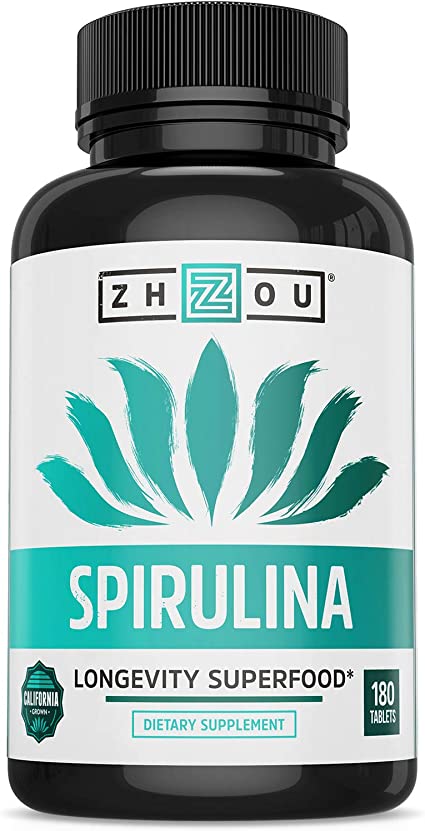Spirulina is a blue-green algae. Spirulina has been used for generations by the Aztecs of Mexico and the residents of the Lake Chad region of Africa. The majority of the time, ponds or lakes are used to grow spirulina. Many people don’t know the spirulina health benefits, side effects, and precautions so here, we will explain you in detail.
Fat-soluble vitamins (A, E, and K), fatty acids (DHA, EPA), beta carotene, and minerals are all present in spirulina. It also contains protein, but not enough of some of the essential amino acids your body needs to function properly. So, before intake people should know spirulina health benefits, side effects, and precautions very well.
The following nutrients are found in one tablespoon, or 7 grams, of dried spirulina, per the United States Department of Agriculture (USDA):
- 20.3 calories
- 4.02 g of protein
- 1.67 g of carbohydrate
- 0.54 g of fat
- 8.4 mg of calcium
- 2 mg of iron
- 13.6 mg of magnesium
- 8.26 mg of phosphorous
- 95.2 mg of potassium
- 73.5 mg of sodium
- 0.7 mg of vitamin C
It also includes vitamins A, B6, and K, thiamin, riboflavin, niacin, and folate. Antioxidants found in spirulina contain the blue-green pigment phycocyanin.
Table of Contents
Uses of Spirulina
The use of supplements needs to be customized and approved by a medical professional. Spirulina contains minerals, protein, phycocyanins, beta carotene, and fat-soluble vitamins (such as A, E, and K). Pharmaceutical, culinary, and even cosmetic industries have all used phytocyanins as a dye.
Spirulina is a popular addition to smoothies and other everyday foods like popcorn and energy bars nowadays and is available as a capsule, tablet, or powder.
Health Benefits of Spirulina
People following vegetarian or vegan diets can take spirulina as a dietary supplement because it is high in protein and vitamins. According to research, it contains anti-inflammatory, anti-oxidant, and immune-system-regulating characteristics. Scientists have investigated the effects of spirulina on various aspects of health, including:
Rich in Antioxidant
The antioxidant ingredient phycocyanin, which gives spirulina its dark blue-green color, is one of many in spirulina that fight inflammation and oxidation. According to studies, phycocyanin may have anti-inflammatory, oxidative stress-reduction, and neuroprotective characteristics.
Lowers Cholesterol levels
According to a study published in the Journal of the Science of Food and Agriculture, adults with high cholesterol who consumed spirulina for three months saw improvements in their triglycerides, LDL cholesterol, and total cholesterol levels. Spirulina prevents cardiovascular disease by lowering harmful LDL cholesterol levels while promoting healthy HDL cholesterol levels. Participants who consumed 1 gram of spirulina daily for 12 weeks saw a 16% reduction in triglycerides and a 10% reduction in LDL.
Studies show that it raises the level of “good” cholesterol. Its nutritional profile (fiber, fatty acids like DHA and EPA), antioxidant capability, or a combination of these factors, according to scientists, may be the cause.
Lowers Blood Pressure
Spirulina can assist in lowering blood pressure. Spirulina consumption of 4.5 grams per day for six weeks resulted in lower systolic and diastolic blood pressure, according to a study. In the experiments, persons with high blood pressure already experienced the greatest blood pressure reduction.
Controls Blood Sugar
Diabetes management and prevention have both been demonstrated to benefit from spirulina. It might be the high protein and fiber content, or even the anti-inflammatory properties of phycocyanin.
A study discovered that adding spirulina to people’s diets dramatically reduced their fasting blood glucose levels. It has about 4 grams of protein per tablespoon, which is beneficial for managing diabetes and blood sugar levels.
Improves Heart Health
Heart disease is associated with both high blood pressure and cholesterol levels. According to a study, spirulina may be useful in preventing chronic inflammatory disorders like heart disease. Spirulina may benefit the heart by lowering blood pressure and harmful cholesterol levels, according to some research. One recent study examined the effect of spirulina intake on LDL levels and discovered that participants’ LDL levels decreased by 10% after consuming just 1 gram of spirulina daily for three months.
Additional research utilizing various dosages of spirulina has looked into its impact on cholesterol levels. According to the findings, spirulina may actually reduce LDL levels.
Reduces inflammation
The body is shielded against oxidative stress by antioxidants. Spirulina is rich in antioxidants, and regular use of it may help to lessen the effects of oxidative stress, hence reducing inflammation and the chance of contracting a chronic illness like cancer.
The component that gives spirulina its greenish-blue color is phycocyanin, which is considered to be the principal antioxidant in this food. It has been discovered that phycocyanin is particularly good at reducing inflammatory reactions.
Helps in Cancer
Other nutrients like chlorophyll and beta-carotene, which have been shown to combat cancer cells and shield vision from aging, are also present.
Spirulina’s potential to fight cancer has also been studied by several health professionals. Spirulina’s key ingredient, phycocyanin, has powerful anti-inflammatory and antioxidant capabilities, making it a nutritious food to fend off cancer and other ailments.
Helps in Anemia
Having insufficient healthy red blood cells, or anemia results in excessive weariness. In some circumstances, spirulina has been demonstrated to assist in preventing anemia. Spirulina pills, for instance, were discovered to raise the hemoglobin content of red blood cells, notably benefiting older women, in a study on elderly people with anemia.
Muscle Strength
Spirulina can assist increase muscle strength, endurance, and performance when it comes to the health advantages of exercise and fitness. In one study, males who used 6-gram spirulina daily for four weeks were able to exercise for longer lengths of time without feeling tired.
Spirulina and Weight Loss
Significant reductions in body fat percentage and waist circumference may be encouraged with the use of spirulina. Overweight participants in the study who consumed spirulina on a regular basis for three months saw a reduction in their body fat.
An individual’s metabolism may be boosted with spirulina, which may increase their level of energy. Additionally, it would increase their daily caloric expenditure, which could aid in weight loss.
Studies show that researchers have examined how spirulina can help obese persons manage their weight. Spirulina did reduce weight in obese people by 4.55 pounds and in overweight people by 2.82 pounds.
Metabolic Syndrome
The effects of spirulina on metabolic syndrome have been researched. 148 When you have high blood pressure, high blood sugar, high cholesterol, and extra body fat around your midsection, you have metabolic syndrome. Your health can suffer if you have metabolic syndrome, which also raises your risk of heart attack, stroke, and type 2 diabetes.
Studies indicated that spirulina might aid in reducing metabolic syndrome symptoms like high blood pressure, high blood sugar, and high cholesterol.
Liver Health
Spirulina’s impact on the health of the liver in those with nonalcoholic fatty liver disease has been researched. A person’s basal metabolism may benefit from spirulina. A person’s ability to burn more calories may help them lose weight if they have a higher metabolic rate.
In a study, participants who consumed 6 g of spirulina daily saw favorable metabolic effects in addition to weight loss and improved health-related quality of life.
Improves Mental Health
Tryptophan, an amino acid that helps serotonin synthesis, can be found in spirulina. Mental health is significantly influenced by serotonin. Low levels of serotonin can contribute to depression, anxiety, and other mental health issues. Serotonin levels can be maintained by taking supplements containing tryptophan.
Improves Eye Health
Beta carotene, an antioxidant, is found in spirulina. Beta-carotene is transformed by the body into vitamin A, which is essential for maintaining eye health.
Spirulina Hair Benefits
Spirulina strengthen your hair, making it thick and shiny. It also boost hair growth and helps in hair fall control.
Best Spirulina for Weight Loss

Side Effects of Spirulina
Those who are sensitive to spirulina may experience an allergic reaction. Rash or swelling would be examples of allergic reactions. If you start to suffer adverse effects, stop consuming spirulina and speak with your doctor.
Although spirulina is typically harmless, some users have complained of the following side effects:
- Allergy
- Headache
- Muscle pain
- Sweating
- Trouble sleeping
Though they are uncommon, the following serious side effects from spirulina have been reported:
- Anaphylaxis (severe allergic reaction)
- Throat swelling
Precautions
Due to its high protein and consequently amino acid content, spirulina may need to be avoided by those with phenylketonuria (inability to digest the amino acid phenylalanine) and other amino acid diseases, such as classical homocystinuria (HCU) or maple syrup urine disease (MSUD).
Spirulina’s safety for use by women who are expecting or nursing has not been determined. If you are breastfeeding, trying to get pregnant, or are already pregnant, talk to your doctor before using spirulina.
Frequently Asked Questions
What impacts on the body does spirulina have?
Potassium, salt, and vitamin A are three micronutrients that are abundant in spirulina. Both potassium and sodium play a role in controlling the equilibrium of bodily fluids, muscle contraction, and nerve impulses. Vital for sustaining the health of the organs is vitamin A. It is also necessary for a healthy immune system, eyesight, and reproduction. Other minerals in spirulina include calcium and magnesium, which support healthy bones, control heart rate, and strengthen the immune system.
Does spirulina make you gain weight?
No, spirulina does not make you gain weight. Spirulina can actually help people lose weight since it satisfies the body’s nutritional needs and prevents harmful desires that cause weight gain.
Spirulina: Is it harmful?
Spirulina can be dangerous to certain people, yes. After consuming spirulina, some people have complained of experiencing headaches, discomfort, nausea, allergic reactions, and insomnia. You should always speak with a doctor before starting spirulina because it may even interact with certain drugs.
What benefits does spirulina provide for the skin?
Spirulina has a number of advantages for the skin due to its high vitamin content, which includes vitamins A, E, and B-12. It improves the skin’s general health, giving it a softer, brighter, and younger-looking appearance. Spirulina’s antioxidants protect the skin from free radicals that harm it and leave it clear of acne and blemishes.
Does spirulina make hair thicker?
Yes, the zinc in spirulina helps to support healthy cell structure, which ultimately results in structurally developed hair follicles. Micronutrients include iron, protein, vital fatty acids, amino acids, and vitamins A and B-12 are also abundant in spirulina. Together, these things fight hair loss and improve the condition of hair.
Yes, spirulina contains amino acids and a number of other micronutrients that strengthen and provide the appearance of lustrous hair. It delivers the necessary amino acids and so prevents hair from going gray.
Is it okay to consume spirulina daily?
Yes, 5-8 grams of spirulina each day are safe to eat.
How quickly does spirulina start to work?
Spirulina can take one to three weeks to start working on your body. The sooner you start experiencing the benefits of spirulina, the healthier your lifestyle is.
Who should avoid consuming spirulina?
Spirulina consumption should also be avoided by people with phenylketonuria (PKU) and autoimmune diseases including multiple sclerosis, lupus, or rheumatoid arthritis due to its potentially harmful side effects.
How does spirulina affect the eyes?
Yes, spirulina contains a lot of zeaxanthin, a crucial component associated with good eye health. Zeaxanthin guards against sun-induced eye damage and may lower the development of cataracts and other forms of age-related macular degeneration.
Conclusion:
Spirulina appears to have a lot of advantages, while the additional investigation is required to confirm the effects that supplementing with it has on health. Having said that, spirulina should be taken with caution, and individuals with medical issues should speak to their doctor before doing so.
Also Read: Omega-3 Fatty Acids: Benefits and Precautions
Image Source: Yandex.com















